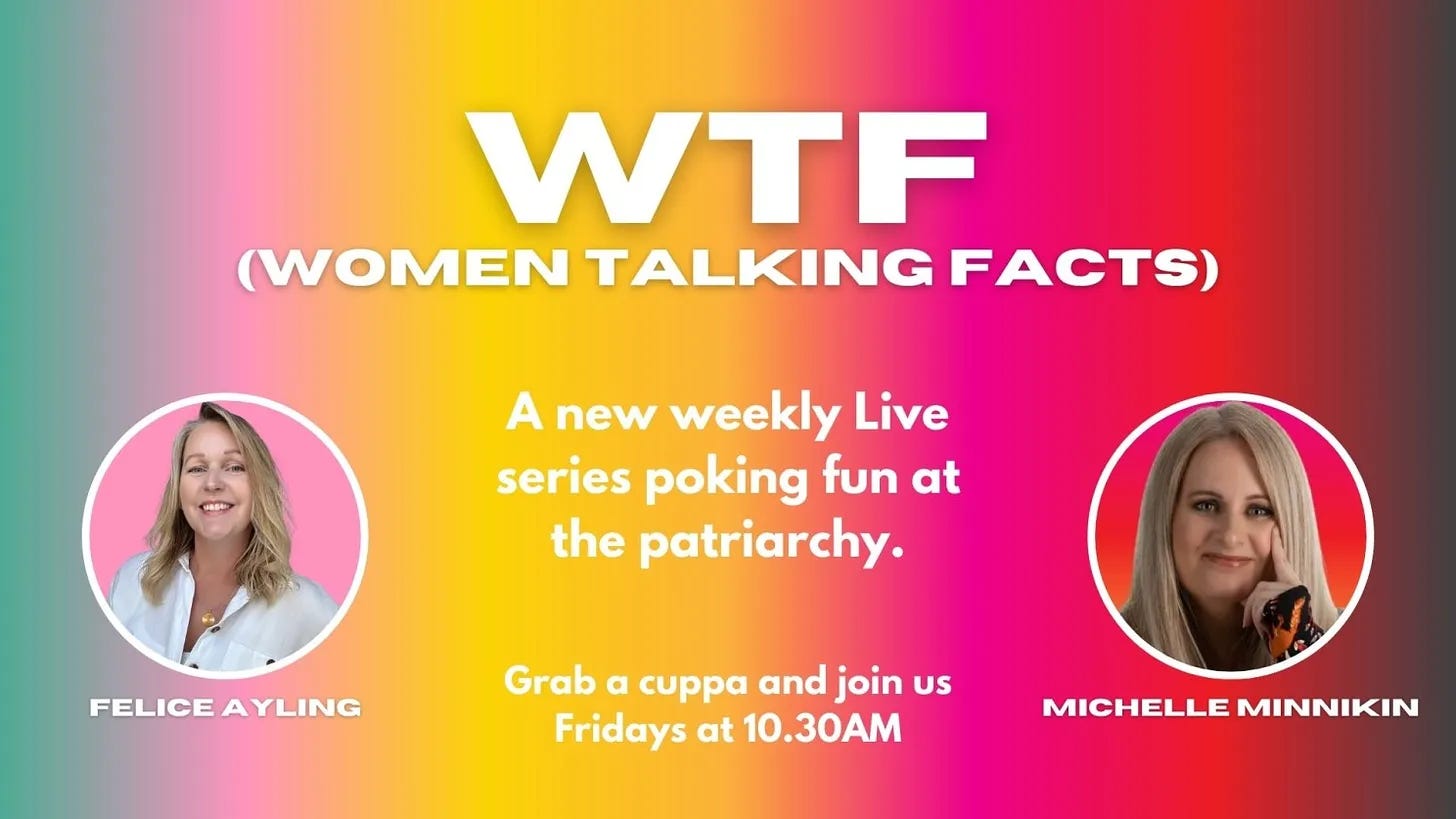Discovering the Sister Wound
And Preparing the Next Generation
This weekend, I immersed myself in an incredible training experience with the one and only Kasia Urbaniak. If you haven’t come across her work, Kasia blends her unique background as a former dominatrix and Taoist nun (yes, you read that right) to teach women how to reclaim their power, authority, and voice. We were looking at it all from a money perspective. It was saucy, raw, and profoundly transformative.
I knew I would leave the weekend with new insights, but I didn’t expect to encounter a concept that would stop me in my tracks. The Sister Wound.
It was a term I’d vaguely heard before but hadn’t paid much attention to - until it came up in one of our sessions. You know that feeling when someone says something, and your whole body reacts, like, “Wait… that’s important.” That’s exactly what happened. The words echoed in my mind like a call to explore something much deeper.
So, naturally, I followed the thread….
What is the Sister Wound, and why did it feel so personal?
What is the Sister Wound? 💔
The Sister Wound is the tension, mistrust, and sense of competition that exists between women. It’s the quiet (and sometimes not-so-quiet) ways we compare, judge, and distance ourselves from each other. It can show up as side-eye glances, silent judgments, or the sinking feeling of “She’s better than me” or “Who does she think she is?”
At its heart, the Sister Wound is a product of “good girl’/patriarchal conditioning. While women may not have written the rules, we’ve all been playing by them. And, of course, one of the most effective rules of control is “divide and conquer.” If women see each other as competition - for jobs, attention, validation, or love - we’re far less likely to come together to challenge the system.
The Sister Wound is not just about jealousy or cattiness (although it can show up that way). It’s deeper.
It’s about how women have been conditioned to believe that:
There isn’t enough to go around (jobs, promotions, opportunities, love, etc.).
Other women are a threat, not allies.
Our success depends on the approval of authority figures (often men) who determine our worth.
If another woman shines, our own light dims.
These beliefs are often unconscious - learned at school, at work, in our families, and from media portrayals of women as rivals, frenemies, or villains in each other’s stories.
How Does the Sister Wound Show Up?
The Sister Wound is sneaky. It shows up in subtle ways, often when we least expect it:
Judgment of Other Women - catching yourself critiquing a woman’s outfit, confidence, or ambition with thoughts like “She’s so full of herself” or “That’s a bit much.”
Fear of Judgment - holding yourself back from being visible, loud, or bold because you’re afraid of what other women will think.
Competition & Comparison - feeling envious of another woman’s success and thinking, “Why can’t I have that?” or “She must have had it easier than me.”
Mistrust of Female Authority - struggling to trust female leaders, bosses, or women in authority because of unresolved past experiences with women in power.
Isolation - feeling like you’re “on your own” because past friendships with women have left you hurt, betrayed, or left out.
Sound familiar? It did for me, too.
Where Does the Sister Wound Come From?
As I reflected on the Sister Wound, I realised just how deep its roots go. Here’s where it comes from:
Scarcity Mentality - historically, there have been fewer opportunities for women, whether it’s jobs, promotions, or social status. When only a small number of women are “allowed” to succeed, it naturally breeds competition.
Divide & Conquer - this is a classic strategy for maintaining power. If women are kept divided, they’re less likely to challenge those in power. This tactic dates back to colonialism, slavery, and patriarchal systems, but its effects remain today.
Internalised Misogyny - from a young age, women are exposed to messages that devalue femininity and prioritise male authority. Over time, these beliefs get absorbed into our subconscious, shaping how we see ourselves and each other. Internalised misogyny shows up when we judge women for being “too loud,” “too confident,” or “too much,” as if they’re breaking an unspoken rule. It’s also at play when we second-guess ourselves, apologise too much, or feel uncomfortable taking up space.
Cultural Myths & Media Tropes - from Mean Girls to reality TV shows that thrive on drama between women, we’ve been spoon-fed the narrative that women are rivals, backstabbers, and competitors. You rarely see media portrayals of women in true solidarity unless it’s a “special, emotional moment.”
How Do We Heal the Sister Wound?
The Sister Wound thrives in secrecy and silence, so healing starts with awareness and conversation. Here’s what I’m committing to:
Name It - recognising when the Sister Wound is showing up in me. If I catch myself being critical of another woman, I’m asking, “Whose voice is this?” Is it really my opinion, or is it conditioning I’ve absorbed?
Shift the Narrative - instead of thinking, “She’s too much”, I’ll reframe it as “She’s allowed to take up space, just like I am.” If another woman’s success triggers me, I’ll remind myself: “Her success does not diminish mine.”
Build Solidarity, Not Competition - if I feel jealousy or comparison creeping in, I’ll turn it into inspiration. “If she can do it, I can too.” I’ll be intentional about celebrating the women around me, not just privately but publicly.
Create Spaces for Real Connection - we heal in community with other women. We need spaces where we feel seen, heard, and supported. I’ll continue to be intentional about nurturing those spaces, whether it’s through friendship, my work, or the Good Girl Deprogramming community.
Deprogramme Good Girl Conditioning (of course!) - the Sister Wound is directly tied to the Good Girl archetype. If we’re raised to please, comply, and “be nice,” then other women who don’t follow those rules are seen as threats. It’s time to break those rules. We don’t have to be “nice.” We have to be free.
Looking to the Future: Supporting the Next Generation
All of this reflection couldn’t have come at a better time. Next week, I’ll be spending half a day with a group of teenage girls at a local school to talk about Good Girl Conditioning. These girls are at such a pivotal age - 13 and 14 - and I can’t help but think about how powerful it would have been if someone had spoken to me about these ideas back then.
They’ll be navigating all the subtle, sneaky expectations that come with being a “good girl,” and I want them to see that they don’t have to follow that rulebook. I want them to know that they are already enough.
This is where you come in.
I want to crowdsource wisdom from my community - from you. If you could give one piece of advice to your 13 or 14-year-old self, what would it be?
It could be something small but profound, like:
“You are allowed to say no without explaining yourself.”
“Being liked by everyone is not a life goal.”
“You are already enough. You don’t have to earn your worth.”
I’ll be gathering your words of wisdom and sharing them with the girls. I want them to walk away with a toolkit of encouragement, empowerment, and perspective that will stay with them long after our session is over.
What’s Next?
The Sister Wound is real, and it’s one of the most powerful tools of control ever used against women. But it doesn’t have to stay that way. If we want the next generation to break free from this cycle, we have to start by healing ourselves.
So, I’m asking you: What advice would you give your 13-year-old self?
Drop it in the comments, send me a message or email michelle@workpirates.com.
Your wisdom could be the exact thing these girls need to hear.
And What Else is Happening?
1. Good Girl Deprogramming Podcast
This week’s episode of the Good Girl Deprogramming Podcast, is a solo one.
I take you on a deep dive into Chapter 3 of my book, Good Girl Deprogramming, titled “Establishing Trust: We’ve Got Your Best Interests at Heart.”
I kick things off with a powerful quote from Stephen King - “The trust of the innocent is the liar’s most useful tool.” This sets the stage for a critical exploration of trust. While trust is essential for human connection, it can also be weaponised to control and manipulate — especially for women taught to “trust the grown-ups” in their lives. This conditioning can leave us vulnerable to manipulation, self-doubt, and a silenced inner voice.
In this episode, I unpack the five key steps to deprogram from this “blind trust” and embrace critical thinking — a vital skill for reclaiming our power and agency. If you’ve ever found yourself questioning your instincts or second-guessing your decisions, this episode is for you.
You can find it on all the usual podcasting platforms or on YouTube
2. WTF (Women Talking Facts)
This week, Felice and I discussed all the incidents of misogyny in the wild with WTF (Women Talking Facts.
You can watch the replay here.
If you want to tune in live, next Friday morning at 10:30, you can do so here.
3. ADHD Made Me Do It
If you’ve read my book or heard me speak, you’ll know that meeting the incredible Anna Price was a total game-changer for me, one of those rare, life-altering moments!
We met when she was sharing her experience with an ADHD diagnosis, and every single word she spoke felt like it was pulled straight from my own brain. Lightbulbs. Fireworks. Epiphanies. The whole lot.
So, when she asked me to deliver a workshop at her retreat next year, I didn’t hesitate. No overthinking. No “let me check my diary.” Just an unapologetic, full-body HELL YES.
Trust me, you’ll want to be there for this one. ✨
There’s more info here and you can book directly on Anna’s website here. Payment plans are being offered too!
Give me a shout if you have any questions at all.
Have a lovely week,
Mx





Interesting and provocative, Michelle